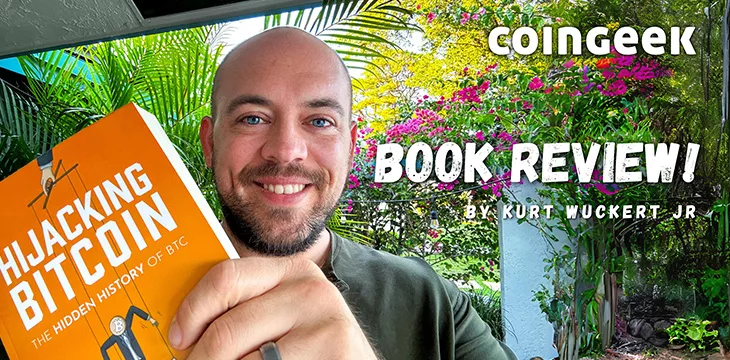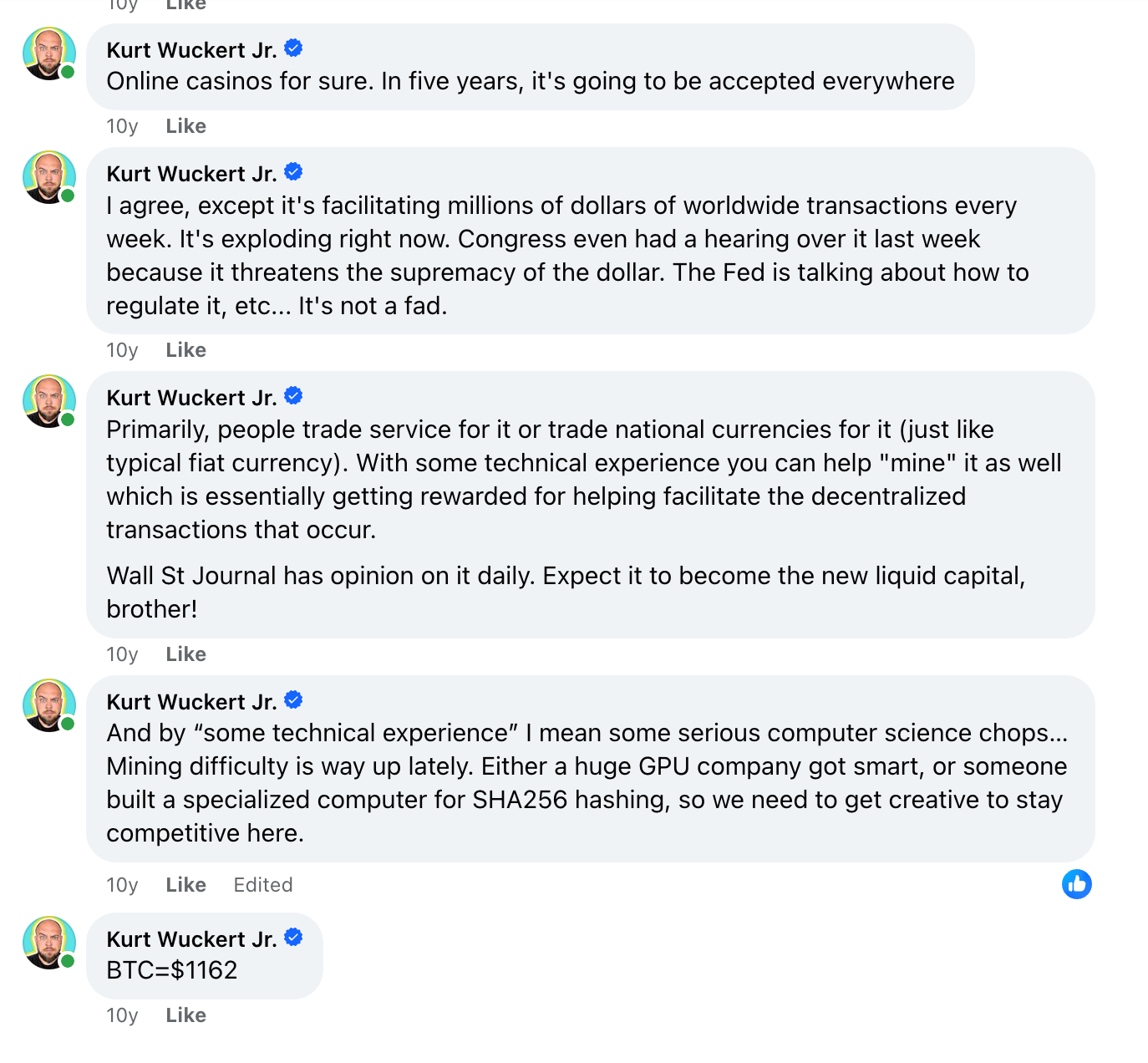
First, a little bit of background. I got into Bitcoin by accident in 2012 but only really got into it deeply in 2013. In the grand scheme of things, I was in “early,” but not early enough or in the right places to be particularly influential until 2016, when I started to do more advocacy on social media. I rarely used Twitter or Reddit, but I ran a couple of very large blockchain discussion groups on Facebook (NASDAQ: META) because it was more conducive to un-moderated conversations where censorship didn’t happen. And the only reason the censorship didn’t happen was because I was in charge of those places.






Roger Ver was one of the very first people whose content inspired me about Bitcoin. Well, he and Adam Kokesh, but he was more my brother’s connection. I discovered some Andreas Antonopoulos content in that era, too, but I heavily preferred Ver’s tone and Socratic style of asking questions and soliciting the underlying root of matters—then there was the fact that he was (and is) a serious Brazilian Jiu-Jitsu practitioner—which was my other weird subculture that I was heavily involved in at the time.
When the Bitcoin Civil War started heating up, I got very into it, and I got into lots of Facebook wars with small blockers. I also got heated with people at the Bitcoin meetups that I had grown to love. In person, everything changed from a culture of people who wanted to change the world with a P2P cash system, and it (d)evolved into constant grand-standing about macroeconomic jargon and talk about “number go up.” This led to me forming the Chicago Big Blockers Meetup, which became the Chicago Bitcoin Cash Meetup, which turned into a BSV Meetup. For a time, I was working with Bitcoin.com (Ver’s company) to educate people about Bitcoin Cash’s place in the Bitcoin Civil War, and I enjoyed working with those guys.
When the BCH Hash War led to the emergence of BSV, I was at a crossroads. I felt very much stabbed in the back by former friends, and I had to reassess my feelings about Ver because BSV was so obviously the version of Bitcoin that he had been fighting for as long as I had followed his work. I ended up being a BSV supporter to see if I could help usher in a truly unbounded version of Bitcoin to the world, and so somehow, I split from my favorite big blocker because he chose to advocate for smaller blocks and a soft protocol. Wild…
Not long after this all happened, Ver went on a very long hiatus from social media (presumably to write Hijacking Bitcoin,) and it was hard that he was gone. Even though we found ourselves on opposite sides of the big blocker politics, his voice in telling the truth about Bitcoin’s subversion was sorely missed.
Now that I have disclosed my history on the subject…
The book
Hijacking Bitcoin is very well written. It gives an evidence-based and truly gut-wrenching retelling of the Bitcoin Civil War, full of verifiable and well-sourced quotes from the people involved on all sides of the discussion. On the one hand, reading it was liberating as a reminder that I am not crazy in my recollection of the extreme amounts of subterfuge and toxicity that undermined the Bitcoin experiment by the likes of Gregory Maxwell and his surrogates. But on the other hand, it feels like I imagine it must feel for Polish refugees to read a first-hand retelling of the invasion of Poland by the Nazis and then by the Soviets. It feels good to be represented in print, but it is also nauseating to relive memories of the devastation of places, people, and things that you loved.
The bizarre thing for me, personally, is that I hadn’t realized just how much my own work on the subject of the Bitcoin Civil War was echoed. In fact, across 99% of the content, it felt as though I could have written it myself, both in content and tone. This isn’t a criticism of Ver’s work or Steve Patterson’s—who co-wrote the book. Instead, it was a realization that in my role as “Bitcoin Historian” over the last several years, it has become near impossible to honestly tell the story any other way, and the fact that Roger, Steve, and I have all had some interactions, conversations, lots of mutual friends and at least some influence on each other was almost surreal to experience. We all, now obviously, have a lot in common experience, knowledge, and communication style with each other, so that was interesting to grapple with.
The other thing that stood out was just how deeply and in a coordinated fashion so much of this stuff occurred. The book does a masterful job of illustrating the kindness and (respectfully) the naivete of Gavin Andresen in his interactions with the machiavellian small blockers, and my favorite parts were the direct quotes from Mike Hearn. Hearn’s frank and cutting criticisms of the audacity of the small blockers brought me to audible laughter more than once, and recalling these exchanges made me wish I had joined some of these forums earlier to help defend him. In many ways, he was a lone warrior with very little help.
In contrast, the small blockers were unified in their messaging and their desire to control Bitcoin and remake it in their collectivist image. Seeing the clearly coordinated control exerted on the culture by guys like Gregory Maxwell, Theymos, Cøbra, and other hard-line small blockers was heartbreaking. What was almost humorous to see in print was some of the bizarre changes in narrative from folks like Adam Back, who seemed to be embarrassed by the most brazen small blocker narrative nonsense and trolling and, in fact, was even an advocate for hard forking to bigger blocks early in the wars.
It was especially fulfilling to see Ver acknowledge the clear conflicts of interest among the investors in Blockstream and related startups. This included the difficult-to-explain connections to the Bilderberg group and big payment companies like MasterCard (NASDAQ: MA). I have staked my reputation on reporting about the clear conflicts of interest with these companies being involved in paying BTC Core Devs, and it was vindicating to read Ver’s strong take on the facts.
Rhetoric
As a history of the Bitcoin Civil War, the book is masterful. It brings in clear passion without being heavily opinionated and simply tells the story as it happened. Anyone who wants to learn about how Bitcoin got taken over should start with this book.
Where I have to criticize the book is the contrasting soft stances on a few issues. What stood out to me the most was Ver saying he did not have a technical criticism of Segwit. I recall many, many times when Ver masterfully explained the problem of replacing Bitcoin signatures with witness data, so to see him soften on that issue struck me as strange. He also made a pivot at some point in the last couple of years from being a Bitcoin advocate to being a “cryptocurrency advocate,” and it just makes me cringe every time I read or hear it. Softening from “Bitcoin Cash is Bitcoin” and turning it into “cryptocurrency is an important tool for freedom, and I hope one of them becomes P2P cash” doesn’t strike me as a winning strategy, especially because it is the product of compromise with the objectively awful people who took over BTC.
Lastly, Ver’s contention that BCH is the antidote to the woes of BTC just feels like a half-measure at this point. BCH is not fundamentally different from BTC. It is still a fork of the Core software, has dependencies on many aspects of Core’s roadmap, and has no innate ability to scale any more than BTC does. BCH still carries much of the confusion about the role of nodes, and the BCH developers don’t seem to understand that a monolithic implementation of Bitcoin literally can’t scale, but because the work to prove it was done by the BSV community, the political winds blow back into the picture, and these simple facts had to get overlooked.
Ultimately, for me, at least, the book reads like a tragedy. It’s an obituary to Bitcoin. We were quite possibly all too disorganized and focused on the wrong goals to win against the well-funded and well-coordinated opposition that turned themselves into the majority controllers of BTC with money and strategic advice from big tech, big banks, and big government.
The only chance we have is to bring big business to the blockchain and give the world valuable utilities that it cannot get in any other place such that hash power and rational, profit-seeking economic actors make their way to big block Bitcoin. But they aren’t going to come just because of a book. They need to be shown that the Bitcoin that scales is valuable because of the business it creates, not because of the price of the asset.
Summary
The book gets a B-. It started very strong, clearly explaining Satoshi’s vision for Bitcoin, its history, and the people who sought to suffocate it in the cradle. But when I was looking for hope and a battle cry, I found myself wishing for a stronger signal or a solution to bring the troops back together to take back Bitcoin from the small blockers, and I don’t think Ver drove that point home.
For newcomers to Bitcoin, though, this book is a critical piece of history and a strong counterpoint to The Blocksize War by Jonathan Biers, which painted big blockers as strawmen and small blockers as heroes in every regard. That book was nauseating, so it is nice to finally have a written history in simple form that can be passed along to new Bitcoiners for years to come!
Watch: Is your company ready to ride the wave of blockchain adoption?
New to blockchain? Check out CoinGeek’s Blockchain for Beginners section, the ultimate resource guide to learn more about blockchain technology.















































































Be the first to comment